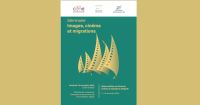The immigration file may not be sexy, but it is surely significant in an aging and demographically-challenged Canada. The issues of immigration numbers, integration, citizenship rules, family unification, refugees and reasonable accommodation are all of national importance.
Yet again, immigration is a no-show in yet another federal election campaign season. Why? What is behind this culture of silence, especially given the traditional importance of the immigrant vote to the Liberal party’s fortunes in Ontario, Montreal, Vancouver and particularly in the vote-rich GTA? And now that the NDP is seen as a viable agent for change, it should tell Canadians of its plans on immigration.
Prime Minister Stephen Harper’s regime has made drastic, fundamental, even revolutionary changes to the immigration and refugee system.
First, the economic stream. The Conservative government changed the skilled immigrants program by imposing a new management system called “Express Entry” to manage applications for permanent residents under the following federal economic programs:
• The Federal Skilled Worker Program
• The Federal Skilled Trades Program
• The Canadian Experience Class
Potential candidates complete an online Express Entry profile emphasizing their skills, work experience, language ability, education and adaptability and spouse’s input. The new system has fundamental weaknesses, such as lack of transparency, accountability and any control by the applicant over the process. Decisions are taken in the dark with little knowledge of the selection process and by invisible decision-makers.
Second, the drastic changes to the citizenship regime. Immigration Minister Chris Alexander introduced the Strengthening Canadian Citizenship Act in Bill C-24 this year. Lorne Waldman, one of Canada’s foremost immigration and citizenship lawyers, wrote a scathing analysis of the new law, saying: “Under the proposed changes (they are now the law of the land), a person will only be eligible for citizenship if they satisfy the minister that they intend to reside in Canada after they obtain citizenship. This only applies to naturalized citizens … that’s not a way to foster a citizenship of commitment. That’s a way to foster a citizenship of fear.”
In fact, this new system could potentially create a two-tier citizenship streams: The born-in-Canada citizen vs. the naturalized citizen, making them unequal before the law.
Furthermore, the government is granting under this new law extensive discretionary powers to immigration officers unprecedented in Canadian immigration history. They could refuse citizenship based on their subjective understanding of an applicant’s intent to reside in Canada. Add to that the requirement to be in Canada at least 183 days in each calendar year for four out of six years. This Act may well be tested and challenged in the Supreme Court under section 15 of the Charter (equality rights). Opposition politicians should take notice.
Third, family unification and sponsorships. The present government has reduced the sponsorship of parents and grandparents virtually to a minimum. The program was opened in 2015 for a cap of 5,000 applications and was filled within a month or so. The program is dying and only the funeral arrangements are missing. That should be an election issue.
Immigration is becoming slowly but surely the lifeblood of the Canadian economy, so the Liberals and the New Democrats cannot afford to lose their focus on this issue.
Multiculturalism is still respected and revered in Canada given the upheaval around the globe, and it is key to a prosperous economy. Robert D. Putnam, a prominent political scientist in the U.S., once remarked that, “The most certain prediction that we can make about almost any modern society is that it will be more diverse a generation from now than it is today.”
Let the immigration debates begin. Our future depends on it.
Source: Ottawa Citizen





